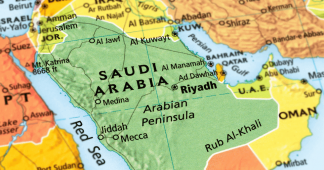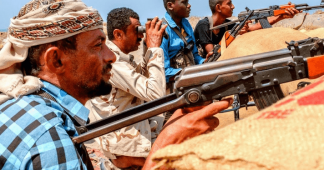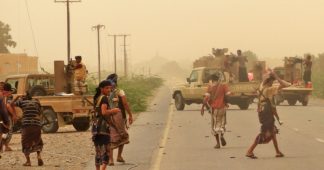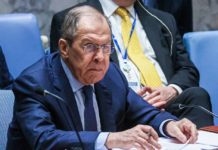By Tariq Ali
02 April 2021
The Saudi offer of a ceasefire in Yemen on 22 March was an acknowledgement by Riyadh and its backers in Washington that they had lost the war. Biden signalled the grudging surrender in February, when he announced the US would end its support for ‘offensive operations’ there. After six years of bombardment and blockade, Houthi forces are poised to take the strategic central city of Marib. They demanded that the aggressors – Saudi Arabia, the UAE, the US, UK and France – lift the stranglehold on the Red Sea port of Hodeidah, cause of a humanitarian catastrophe of famine and epidemics in the country, before sitting down to talk.
The Houthi alliance would most likely have taken the country in 2015, sweeping away the weak government headed by Saudi stooge Abdrabbuh Mansur Hadi, if Obama had not greenlighted the Saudi assault against them. The war on Yemen began as part and parcel of the celebrations that ushered in the young, ‘dynamic’, ‘modernising’ Prince Mohammed Bin Salman (MBS) as the de facto heir of the Kingdom. In January 2015, MBS’s doddering, octogenarian father ascended the throne as King Salman, and MBS was appointed Saudi Defence Minister. Obama indulged MBS’s itch for war as a sop to keep the Saudis onside while he pressured Iran to accept the US nuclear deal. On the eve of the 25 March 2015 Saudi invasion, the White House issued a statement supporting military action ‘to protect Yemen’s legitimate government’ – i.e. Hadi, who was hiding out in Riyadh, having been ousted by mass protests a few months before.
Two weeks into the invasion, Anthony Blinken, then Obama’s Deputy Secretary of State, announced: ‘Saudi Arabia is sending a strong message to the Houthis and their allies.’ He added that the US was expediting weapons deliveries. Billions flowed to Boeing, Raytheon, Lockheed Martin, DynCorp and Textron (who provided the notorious, UN-banned cluster bombs which the Saudis dropped on residential neighbourhoods of Sana’a). The Obama White House signalled it would also provide logistical and intelligence support, including target selection. British intelligence operatives had already been despatched to assist Obama’s drone strikes in Yemen, identifying targets for the US bombing operations that killed an estimated 1,775 people on the thin pretext of ‘counterterrorism’ during the first decade of the War on Terror. Since 2015, the UK has supplied the Saudis with aircraft, weaponry, training and aerial equipment, as well as SAS fighters. The US has lavished high-tech weaponry and military aid on MBS, with Obama offering to provide over $115 billion worth of arms to the Saudis in 42 separate deals, and Trump signing a $110 billion agreement with the Kingdom in 2017.
The result? The worst humanitarian catastrophe since Iraq. Cholera and hunger on a scale that has not been seen since the last century, with some 20 million experiencing food insecurity and 10 million at risk of famine. An estimated 110,000 have been killed in the fighting, with a death toll of 233,000 overall, mostly due to indirect causes such as lack of food and health services. Few of the country’s medical facilities are functional.
The UK’s arms sales, approved by the High Court in 2017, are on the scale of £5 billion – while its humanitarian aid to Yemen has just been cut by nearly 60 per cent, to £87 million. In this context, it’s worth recalling John Major’s private remark to the late Sir Martin Gilbert that, after giving a footling ‘lecture’ to a tiny group of people in Saudi Arabia, he was surprised to find his hosts handing him a very handsome cheque. Most servants of the British security state understand that this is part of their retirement package. Compared to Saudi largesse, the consulting fees doled out to David Miliband by his Pakistani and Emirati patrons must be peanuts. Lucrative connections of this kind help explain the role of British politicians in the conflict.
As for MBS, Western media outlets swallowed the Saudi publicity, promising great things and new beginnings. The Kingdom was at last taking steps towards becoming a ‘liberal’ state with a ‘diversified’ economy. Notable cheerleaders were David Ignatius in the Washington Post and evergreen apologist Thomas Friedman at the New York Times. As the Saudi war in Yemen escalated in 2016, Ignatius gushed: ‘MBS proposes a series of sweeping reforms. Saudi Aramco and other big, state-owned enterprises would be privatised; cinemas, museums and a “media city” would be created for a young population starving for entertainment; the power of the religious police would be curtailed; and, at some point, women would be allowed to drive.’
When potential MBS opponents in the Royal Family were removed from key positions and placed under house arrest (albeit in a five-star hotel), the Western media treated it as a local peccadillo. ‘This is a man to do business with’, cooed the Financial Times editors in a leader of March 2018. The Economist published glossy ads for Saudi privatisation tenders.
As pointed out by the Saudi historian Madawi al-Rasheed (one of the few genuinely critical voices in exile) in the London Review of Books, this reception was backed by a multi-million-pound propaganda campaign, handled in Britain by Freud Communications and the strategic consultancy Consulum. Before MBS’s visit to Downing Street in 2018, billboards in London were plastered with his portrait, headlined ‘He is bringing change to Saudi Arabia.’ An ex-employee of one of the firms told a reporter that representing a client like Saudi Arabia was like being a defence lawyer: ‘You have to work to get the client out of trouble.’ MBS was duly given a red-carpet welcome and lunch with the Queen. As al-Rasheed noted: ‘No one thought to bring up his destruction of Yemen or his detention of political enemies.’
The killing of Jamal Khashoggi in October 2018 made it more awkward for MBS and his state-funded gangsters to maintain this positive spin. Khashoggi, previously a stalwart defender of the Saudi Royal Family, was hostile to the interloper and wrote as much from his platform at the Washington Post. That was his real crime as far as the ‘liberaliser’ was concerned. The victim was lured to the Saudi Embassy in Istanbul, tortured at leisure and bone-sawed into segments, which were packed into diplomatic bags and sent back to Saudi Arabia. All this was secretly recorded by the Turkish state, which duly handed over the snuff-doc to the US after leaking the most grizzly details to the press. The Americans sat on it until last February, when a declassified report by the intelligence agencies concluded that it was undoubtedly MBS who ordered the hit. Biden, Johnson, Macron and Merkel – quick on the draw when it comes to imposing ‘human-rights’ sanctions on enemy states – promptly agreed to forgive the Saudi criminal, imposing no consequences for his actions.
How has the Houthi alliance managed to prevail against the world’s most powerful states? The Zaydi Shi’as from Yemen’s mountainous north had long played an important role in the region, fighting both Ottomans and Wahhabis. (Zayd, the great-grandson of the Prophet’s son-in-law, Ali, had led a revolt against the Umayyad Caliphate in 740AD.) The Zaydi tribes were a dominant force under the Shi’a Imamate that ruled the country for centuries. After the fall of the Ottomans, a Zaydi monarchy ruled North Yemen until its overthrow in the republican revolution of 1962. Sixteen years later a Zaydi republican general, Ali Abdullah Saleh, succeeded in imposing a new dictatorship on the north. After 1990, his regime pushed through a take-over of Soviet-aligned South Yemen, later reinforced through civil war. (Yemen has long been more populous than Saudi Arabia, and – though officially Saudi Arabia now has 34 million to Yemen’s 30 million – may still be, if foreign workers are subtracted from the Saudi total.)
In the 1990s, Zaydi resistance to Saleh was spearheaded by Hussein al Houthi, leader of a small clan in the north. Radicalized by the US War on Terror and invasion of Iraq, the group founded Ansar Allah, or ‘Supporters of God’, and engaged in a tireless guerrilla war against Saleh, whom it excoriated as a puppet of Washington and Riyadh. Thousands joined the Ansar Allah’s ranks, taking its estimated number of fighters from 10,000 to 100,000 by 2010. However, clashes with Yemeni state forces were mostly confined to the Houthis’ mountainous home province until the following year, when the Arab Spring transformed the country’s political landscape.
In 2011, inspired by the Tunisian revolution, protesters flooded Yemen’s urban centres, occupying public squares and state buildings while chanting their demands for jobs, incomes and fair elections. This mass movement succeeded in forcing Saleh from office in February 2012. Yet the replacement ‘transitional government’ installed by the Gulf Cooperation Council was headed by Saleh’s Vice President Hadi, a Saudi-backed Sunni, and awash with figures from the old regime and the Islamist Islah party. Their corrupt and incompetent administration did nothing to quell the widespread discontent. Hadi further antagonized the masses by raising diesel prices at the behest of the IMF. The Houthis continued to agitate against it, expanding their military presence across the country and forming an alliance of convenience with their erstwhile enemy – the ousted Saleh.
Though Western powers threw their weight behind Hadi’s transitional government, it was no match for this new partnership. Saleh retained high levels of support within the security services, while the Houthis were able to mobilize their vast militias to march on the capital. Between late 2014 and early 2015, Saleh–Houthi forces stormed Sana’a, seized key political and military buildings, formed a ruling council and exiled most of the transitional regime – meeting barely an iota of resistance along the way. The Houthis’ decentralized command structure allowed them to draw in diverse actors and forge partnerships with Sunnis who oppose the central government. They would have gone on to capture the entire country if not for the Saudi-led bombing campaign, Operation Decisive Storm.
Intermittent clashes between Riyadh and the Houthi rebels on the Saudis’ southern border long pre-dated the outbreak of war. Saudi sectarians had always been determined to crush the Shi’a Houthis, whom they accused of being Iranian relays. In fact, the Houthis’ military training was the fruit of decades of struggle against Saleh, not from any foreign backer. By instigating the brutal bombing and blockade campaign against them, MBS hoped to assert his authority in the region, pose as Yemen’s saviour and impress the Israelis (who also regarded the Houthis as an Iranian pawn). ‘Liberated’ from Saleh–Huthi control, southern Yemen quickly deteriorated into a morass of competing militias under loose Emirati supervision. A military stalemate ensued.
Despite constant Saudi cluster-bombing – targeting civilian gatherings, schools, medical facilities, key infrastructure and ancient heritage sites – the Houthis held on in their urban strongholds. Hadi remained president in name only, living under effective house arrest in Riyadh. After two fraught years, the Houthis’ alliance with Saleh predictably unravelled. The former accused the latter of conspiring with the Saudis and Emiratis, and a series of clashes broke out in Sana’a culminating in Saleh’s assassination in December 2017. From this point on his loyalists were marginalized, leaving Ansar Allah as the only significant rival to the Saudi coalition.
Despite their shortcomings, the Houthis continue to enjoy more popular support than the Saudi-led forces of aggression for reasons that are both historical and immediate. Yemen is one of the oldest countries in the region, unlike the real-estate kingdoms and sheikdoms first set up by the British and later the US. The country has a distinctive cultural memory, visible everywhere in its astonishing early Islamic architecture. Much of the population views the Houthis as the sole defenders of this sovereign legacy. Their control of cities like Sana’a, Saada and Taiz – along with the country’s most densely populated governates – is based on this deeply rooted perception, as well as the more imminent necessity of resisting the Wahhabi Kingdom.
In their support for this murderous war, the US and UK have found a willing servant in the UN, which continues to recognize Hadi’s government as Yemen’s rightful rulers despite its non-existent mandate. The UN Security Council has imposed sanctions on the Houthis and Saleh, but not on Hadi’s forces or their foreign allies. It has removed the Saudi coalition from its blacklist of actors violating children’s rights, despite hundreds of children being killed each year by anti-Houthi airstrikes; winked at the Saudis’ obstruction of humanitarian aid; and steadfastly passed resolutions which call for absolute Houthi surrender as the precondition for any dialogue.
MBS would now like to achieve through a peace of the graveyard what he has failed to secure via bloody and ruthless war. His planes have been downed, drones have hit Riyadh, and his army – designed for show rather than for battle – has suffered serious setbacks. UAE ground troops were forced to withdraw in July 2019, whereupon the Abu Dhabi regime shifted to funding a political coalition based in Aden.
Though Biden has signalled the US will end ‘offensive operations’, it will continue to provide Saudi Arabia with ‘defensive weapons’, which appear to serve much the same purpose. His Administration has said nothing about halting technical, logistical and intelligence operations. By all indications, its plan is still to extract an unconditional surrender from the Houthis while maintaining its disastrous ‘counterterrorism’ operations in the country. To date, Biden’s promised ‘recalibration’ of the US–Saudi relationship is nowhere to be seen.
In recent weeks, Foreign Office apologists and linked flotsam and jetsam have criticised the Houthis for turning down Saudi ‘offers’ of negotiation. Yet as even The Economist has pointed out, there is nothing new in these proposals. They are stale repetitions of yesteryear – calling on Ansar Allah to relinquish its military gains, surrender to the Saudi-led coalition and turn Yemen into a Western vassal state, while receiving nothing in return. As if to illustrate the vacuity of this ‘ceasefire plan’, MBS decided to rain bombs on several Houthi sites just hours after it was issued.
The brutal fact is that Yemeni lives – like many others – are expendable for US Senators and British MPs, who form part of a chain of imperialism that extends back for many centuries. Britain itself is a satrapy, prime ministers from Thatcher to Johnson little more than adjutants to the White House. Revelling in that status, they would like nothing more than to drag Yemen into their tent. So far they have failed. The costs of this venture have been high for the people of that beleaguered country, much higher than the profits accruing to the arms industries. Yet a permanent arms economy requires two, three, many ‘humanitarian wars’. Yemen will not be the last.
Published at newleftreview.org











